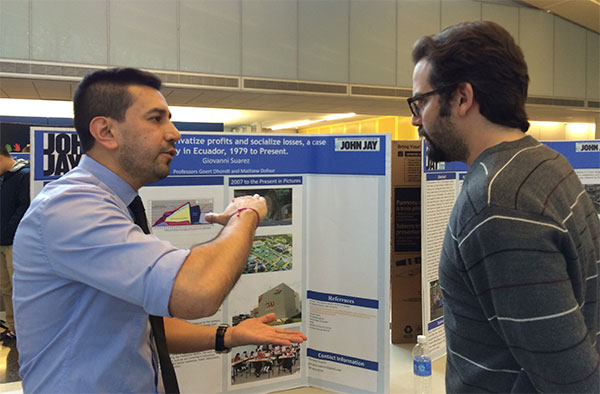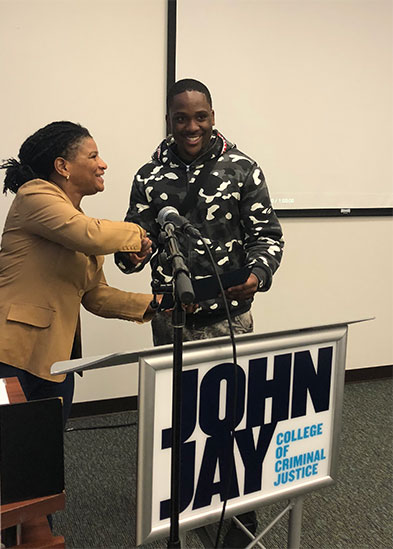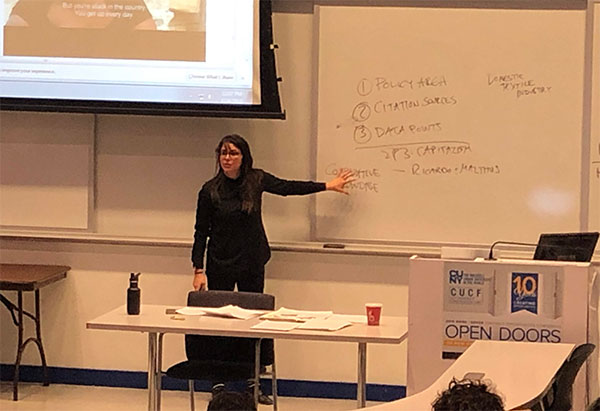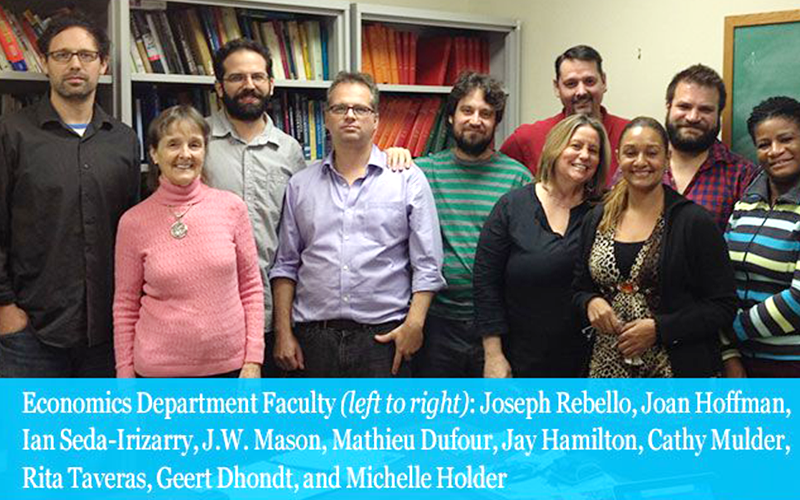John Jay’s Economics department has only been around for 10 years but it’s quickly making a name for itself. Ranking among the top 10 in the Federal Reserve’s Economic Education Inclusion Index—it was number seven on the index and ranked first among colleges in the City University of New York (CUNY) system—John Jay’s Economics department grants a large number of degrees to students who are Black, Latinx, and women, three underrepresented groups that are often excluded from the economics field. “The diversity of students at John Jay and the fact that most come from New York City working-class families creates a great atmosphere for teaching economics,” says Geert Dhondt, Chair and Professor in the Department of Economics, who attributes the department’s achievements to the College’s commitment to student success and mission of increasing social mobility for underrepresented groups.“Teaching students at John Jay is one of my greatest joys, because our students are engaged, excited to learn, and open to the world.”
“The diversity of students at John Jay and the fact that most come from New York City working-class families creates a great atmosphere for teaching economics.” —Geert Dhondt
Acknowledging the Numbers
When you look at how many Black and Latinx folks earn a degree in Economics and compare it to the country’s population, the numbers are staggering. “Black and Latinx people make up about 30 percent of the U.S. population, and women make up just over half of the population, but this isn’t the case in the field of Economics,” explains Dhondt, as he illustrates the deep disparity. “Together, Black and Latinx graduates make up only 11 percent of those receiving a bachelor’s degree in Economics, and on the master’s degree level, Black and Latinx people make up only four percent,” he says, adding that for women, those numbers hover at about 30 percent for both degrees. “But John Jay’s Economics program is remarkably different,” says Dhondt. “Women make up over half of all bachelor’s degrees awarded, while Latinx graduates make up 43 percent and Black graduates make up 23 percent. In our master’s program, Black and Latinx students make up a total of 67 percent of our graduates and women 50 percent.”

“We live in an unjust world and studying economics is fundamental to understanding all of those struggles for justice.” —Geert Dhondt
Building a Department
The department’s success with students can be attributed to a number of important factors: a faculty that’s devoted to seeing its student’s earn their degree; the department’s strong connection with alumni, many of whom come back to teach in some capacity; a curriculum that is reflective of the students’ experiences; and the department’s approach to teaching a number of economic theories. All of this was done by design, according to Dhondt who arrived at John Jay in 2009. “When I first came to John Jay, it was still transitioning to a senior college. Economics was one of the first new liberal arts majors, and the department was brand new which created an enormous opportunity for us to really shape the major and align it with the College’s justice-focused mission,” explains Dhondt, further linking Economics with justice. “We live in an unjust world and studying economics is fundamental to understanding all of those struggles for justice. Understanding capitalism is needed in order to explain the reason why these injustices exist and continue. Injustices don’t exist because rich and powerful people are mean; injustices exist because of the way the economic system is set up to benefit some and hurt others.”
As they built the department, Dhondt and his colleagues focused on getting rid of what was deemed “traditional economics baggage,” and instead embraced an array of economic theories that were more relatable and accessible to students. “In the popular imagination, economics is confusing, technical and has to do with money, finance, banking, interest rates, and the stock markets,” says Dhondt, adding that traditional mainstream, neoclassical economics focuses on a small part of economics and how individuals make choices in an environment constrained by scarcity. “But it’s not only about those things. Economics is fundamentally about relationships between people. It studies how the structure of institutions, the behavior of groups of people, and the behavior of individuals generate patterns in the spheres of production, distribution and consumption of goods and services while addressing fundamental questions such as: what gets made; who has to make it; who gets to consume it; and who profits? In creating this department, we wanted our students to know that economics encompasses so much more.”
“Injustices exist because of the way the economic system is set up to benefit some and hurt others.” —Geert Dhondt
With the goal of reimagining economics, Dhondt along with the entire department, decided to teach the subject through a more relatable and approachable lens—the working-class perspective. “At John Jay, we consciously made a choice to teach economics from a working-class perspective, which deeply resonates with our working-class students,” he says, explaining that by using a pluralism of economic theories they are better able to engage students. “Our students are not just exposed to neoclassical economics but also to alternative economic theories like Institutional, Post-Keynesian, Feminist, Stratification, Modern Monetary, Marxian, and Austrian Economics, that often make more instinctive sense and are relatable to their own life experiences.”

an economics honor society, award ceremony.
“If more economists from underrepresented groups join the ranks of the economics profession, the economics discipline itself will change, and that’s a good thing.” —Geert Dhondt
Diversifying the Field
Diversity is one of John Jay’s greatest assets and for the Economics field diversity is exactly what’s needed to help it evolve. “Increasing diversity is crucially important because it will change the nature of economics both by the way it’s studied as a field and what is studied in economics.” Citing examples, Dhondt shows how voices and perspectives from diverse backgrounds can help change systems. “Think of it this way, if you look at the sport of tennis, Venus and Serena Williams didn’t just join tennis, they changed the sport. That’s powerful. If more economists from underrepresented groups join the ranks of the economics profession, the economics discipline itself will change, and that’s a good thing.”

Working in Every Market
Graduates of John Jay’s Economics program have gone on to work in a variety of different sectors across the world, making the degree a real opportunity maker. “Economics is a well-respected degree that combines theory with asking the big questions, you also develop your writing and quantitative skills—skills that are essential in any field. With a degree in Economics, your career possibilities are endless,” says Dhondt. “Our graduates go on to law school, medical school, Ph.D. programs, or to earn their master’s degree. Some go on to work in corporate America, while others work for government and non-profit agencies, and some join the NYPD and FDNY.” The far-reaching success of its alumni is a testament to the Economics department’s ability to truly see and uplift its students, helping to bring a degree in Economics, and all the advantages that come from that degree, to populations often left out of the grander, national Economics narrative. “On the first day of class, when students leave our Economics classrooms, our hope is that we made them excited to learn and understand the world,” says Dhondt. “And when they walk away with that bachelor’s or master’s degree in Economics in hand, our hope is that they feel proud of themselves and of their journey at John Jay, and that they take what they’ve learned here, go out into the world, and ask the right questions.”
